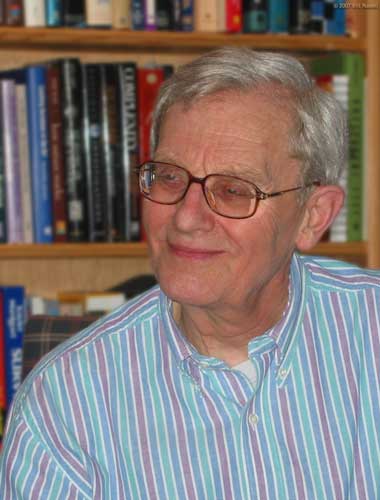 |
|
John Eidinow... journalist. He and David Edmonds have co-authored three books exploring the stories behind “celebrity dustups”: Rousseau's Dog: Two Great Thinkers at War in the Age of Enlightenment (David Hume & Jean-Jacques Rousseau); Bobby Fischer Goes to War: How the Soviets Lost the Most Extraordinary Chess Match of All Time (chess-masters Fischer & Boris Spassky); and international best-seller Wittgenstein's Poker: The Story of a Ten-Minute Argument Between Two Great Philosophers (Ludwig Wittgenstein and Karl Popper). Mr. Eidinow was and Mr. Edmonds is with the BBC, both have won many awards for their work. |
|
 1:13 1:13 |
You learn a lot more about people when they're quarreling than when they're friendly, especially when the argument involves big names, big genius and big egos, says John Eidinow. He and co-author David Edmonds have written four books about great intellects -- philosophers and chess masters -- consumed by bitter quarrels. And when the argument's over, Mr. Eidinow warns, be wary of "victor’s justice." It’s too often what gets reported (or told in a memoir) and can be winner-takes-all.
"When people quarrel, they expose themselves a great deal more than when they’re friendly. What makes them tick? What are the rules they live by? What are their feelings? All these things come at that point, they affect the whole run of their relationship within this narrative."
The two authors' third book rekindles the famous argument between two men whose monumental ideas influence us centuries later, the singular philosophers David Hume and Jean-Jacques Rousseau. They were key players in a struggle that continues to this day: the relationship between reason and emotion.
"We’re dealing with two quite remarkable thinkers who change the world. David Hume drew a line under all previous philosophy -- that’s what puts him up there in the pantheon with Plato and Kant and Wittgenstein. He changed the way we see reason, reasoning and its limits.
"Rousseau changed the world in quite a different way. He changed the way in which we see man and his relation to society; the equal worth of men; man’s relations to nature; childhood. He also puts limits to reason because he elevated feelings and gave them equal primacy with reason. So we’re dealing with two men of immense importance against the background of the Age of Enlightenment."
The argument also involved all the prominent figures of France, Scotland and England and had an extraordinarily rich background gallery of figures including Voltaire, Adam Smith and the ladies of the Parisian salons.
"Hume brings Rousseau to England to offer him political refuge. Rousseau turns on him. Hume is naturally upset. In fact he’s much more than upset, he’s extremely angry, he is downright malevolent. That does not fit Hume's character. At the time, he was known for the nobility of his character and he himself constantly stresses his good character. He remarks that he's been tremendously welcome in Paris on account of his morals as well as his genius and it's interesting he puts the word 'morals' first."
Mr. Eidinow says there are a number of ways you can look at the much-studied incident between the two intellectual giants.
"Perhaps if you were going down the path (that it is) a straight-forward comedy of manners, call it a tragicomedy. This celebrity dustup is downright comical. But it’s also a tragedy. There are real feelings of pain on both sides. Friendships get sundered. Something has gone terribly wrong. It is also contains a riddle. The story closely looked at becomes a detective story and the question at its heart is -- why did Hume behave in so un-Hume-like a manner?"
You’ll find the answer in Rousseau's Dog, of course, but here’s Mr. Eidinow's gracious sneak-peak: It's found in each man's enormous humanity.
"There are furies involved. If you pursue the Greek line, there’s no question about that -- furies on both sides."
[This Program was recorded April 5, 2006, in Atlanta, Georgia, US.]
